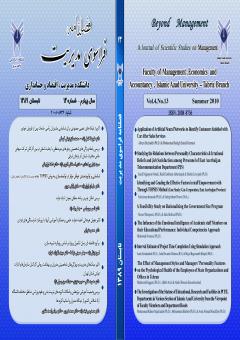تاثیر سبکهای مدیریت و ویژگیهای شخصیتی مدیران بر بهداشت روانی کارکنان سازمانها و ادارات دولتی استان تهران
محورهای موضوعی : مدیریت بازرگانیمحمود حقانی 1 , حبیب عزیزی 2 , عبدالحسین رسولی نژاد 3
1 - استادیار وعضو هیأت علمی،گروه علوم تربیتی،واحد اسلامشهر، دانشگاه آزاد اسلامی، اسلامشهر،ایران
2 - عضو هیأت علمی، واحدخدابنده، دانشگاه آزاد اسلامی ،خدابنده،ایران
3 - مدرس واحد قیامدشت، دانشگاه آزاد اسلامی،قیامدشت،ایران
کلید واژه: سبک مدیریت, رواننژندی, برونگرایی, انعطافپذیری, دلپذیر بودن, با وجدان بودن,
چکیده مقاله :
در این تحقیق به تأثیرسبکهای مدیریت و ویژگیهای شخصیتی مدیران بر بهداشت روا نی کارکنان سازمانها و ادارات دولتی استان تهران پرداخته شده وسؤال اصلی تحقیق بدین ترتیب مطرح گردیده که آیا بین سبکهای مدیریت و ویژگیهای شخصیتی مدیران با بهداشت روانی کارکنان سازمانها وادارات دولتی ارتباط معنیداری وجود دارد؟ روش تحقیق حاضر توصیفی و از نوع زمینهیابی میباشد. جامعه آماری پژوهش تمامی مدیران سازمانها و ادارات دولتی استان تهران می باشند که برای تعیین حجم نمونه از جدول مورگان استفاده گردیده است. پرسشنامههای مورد استفاده در این تحقیق،پرسشنامه سبکهای مدیریتی لوتانز، ویژگیهای شخصیتی NEO وبهداشت روانی (GHQ) میباشد که هرسه پرسشنامه دارای ضریب اعتبار مطلوب میباشند. درنهایت، با استفاده از مدل آماری رگرسیون چندمتغیری با روش ورود همزمان به آزمون فرضیههای تحقیق پرداخته شده است. یافتههای تحقیق نشان داد که ارتباط مثبت معنیداری بین سبکهای مدیریت و ویژگیهای شخصیتی با وجدان بودن ودلپذیر بودن با بهداشت روانی کارکنان و ارتباط منفی معنیداری بین ویژگی رواننژندی با بهداشت روانی کارکنان (01/0=a) وجود دارد.
This research deals with the effect of management styles and managers’ personality features on the psychological health of employees of state organizations and offices in Tehran. The main question is if there is a meaningful relation between management styles and managers’ personality features and the psychological health of employees of state organizations and offices. The research method is a descriptive one. The research population includes all the managers of state organizations and offices in Tehran. The research samples were chosen by Morgan Chart. The questionnaires used in this research are Lotans management style, personality features (NEO) and psychological health (GHQ), which have suitable validity coefficient. Finally, the hypotheses were tested by regression multi-hypothetical statistical model. The results show that there is a positive meaningful relation between management styles and personality features like conscientiousness and pleasantness and employees’ psychological health. Also, there is a negative meaningful relation between the neurotic feature and employees’ pychological health ( α = 0.01 ).
Arvey, R.D., M. Rotundo, Wendy. Johnson, Z. Zhang and M. McGue. (2006), the determinants of leadership role occupancy: Genetic and personality factors. The Leadership Quarterly, No. 17, 1– 20.
Borhani, H. (2000). Investigating Effective Factors on the Maintaining Good and Effective Managers Master's Thesis, Tehran: Tarbiat Moallem University, (In Persian).
Chauhan, S. S.(1991), Mental Hygiene, 2 nd, New Deth Allied Publishers Limited.
Farahani, M. N., & Karami Noori, R. (2004). Third Year Psychology of Literature and Humanities. Tehran: Publishing Company of Iran Textbooks, (In Persian).
Ghahremani; A. (2002). The Relationship between Emotional Intelligence and Gender Roles with General Health and Creativity. Master's Thesis, Tehran: Islamic Azad University, (In Persian).
Golman, D. (2000), Leadership that gets results, Harvard Business Review, 79.
Goleman, D. (1998), What makes a leader? Harvard Business Review, 93-102.
Gorgani; A. (1998). Investigating the Relationship between the Personality Traits of Educational Managers and their Job Stability in three Educational Levels of Schools in Tehran. Roudehen: Islamic Azad University, , (In Persian).
Larence; Parvin, J. (1974). Personality Psychology. Tehran: Rasa Cultural Publishing, (In Persian).
_||_
Arvey, R.D., M. Rotundo, Wendy. Johnson, Z. Zhang and M. McGue. (2006), the determinants of leadership role occupancy: Genetic and personality factors. The Leadership Quarterly, No. 17, 1– 20.
Borhani, H. (2000). Investigating Effective Factors on the Maintaining Good and Effective Managers Master's Thesis, Tehran: Tarbiat Moallem University, (In Persian).
Chauhan, S. S.(1991), Mental Hygiene, 2 nd, New Deth Allied Publishers Limited.
Farahani, M. N., & Karami Noori, R. (2004). Third Year Psychology of Literature and Humanities. Tehran: Publishing Company of Iran Textbooks, (In Persian).
Ghahremani; A. (2002). The Relationship between Emotional Intelligence and Gender Roles with General Health and Creativity. Master's Thesis, Tehran: Islamic Azad University, (In Persian).
Golman, D. (2000), Leadership that gets results, Harvard Business Review, 79.
Goleman, D. (1998), What makes a leader? Harvard Business Review, 93-102.
Gorgani; A. (1998). Investigating the Relationship between the Personality Traits of Educational Managers and their Job Stability in three Educational Levels of Schools in Tehran. Roudehen: Islamic Azad University, , (In Persian).
Larence; Parvin, J. (1974). Personality Psychology. Tehran: Rasa Cultural Publishing, (In Persian).


